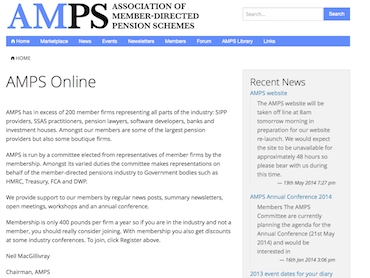The chairman of the Sipp providers' association AMPS has forecast a further rise in the number of complaints about Sipps.
This follows a doubling in the number of complaints about Sipps in the past year which have been dealt with by the Financial Ombudsman.
Neil MacGillivray, chairman of AMPS, said it was clear there was growing abuse of Sipps, particularly by so-called 'pension liberators' and unscrupulous firms trying to use the plans to shift clients' pensions into unregulated investments.
He told sister news website Sipps Professional: "I wouldn't be at all surprised if the number of complaints rose in the short term because of the impact of previous abuses but I'm confident it will reduce because the industry has tightened up its procedures and the due diligence it does on non- mainstream investments.
{desktop}{/desktop}{mobile}{/mobile}
"The problem is that there have been some fraudulent activities taking place and some very poor advice but as an industry we are aware of that and we are doing our best to highlight it and tackle it in partnership with the regulators."
He said some AMPS members were regularly offered Sipp cases that included high risk or unregulated investments and there were signs some unscrupulous firms were 'shopping around' to try to find a Sipp provider willing to accept higher risk business.
He said the problems underlined the need for firms to have their own Permitted Investment Lists – a list of acceptable investment – and focus on turning down poor quality investments. Most now had this, he said. The issue of unregulated investments was debated during the annual meeting of AMPS last week.
Mr MacGillivray was commenting after news last week that the Financial Ombudsman had reported a rise of nearly 50% in the number of Sipp complaints in the past year and the FCA also warned about some firms offering so-called 'free pension reviews' masquerading as post-Budget pension guidance in order to transfer peoples' pensions into Sipps and then use the money to invest in unregulated investments.
The Financial Ombudsman said: "We are currently seeing a steady increase in complaints about the advice to invest in unregulated funds and related Sipps (as well as Sipp-related scams). This accounted for almost 75% of all the Sipps cases we saw."
The spokesman added: "Some consumers are being advised to move their retirement savings into Sipps that invest wholly/partially in unregulated investments such as overseas property, forestry and film schemes on the promise of tax breaks and good returns. Consumers are then later finding out they have no access to or can't find the invested funds."
In the 12 months to the end of March, the Ombudsman received 1,036 complaints about Sipps, a 49% rise on the 697 received the previous year although this was only a tiny fraction of the total 2.3m financial complaints it dealt with during the year.
Tracey McDermott, FCA director of enforcement and financial crime, said: "Most of the companies making these (free pensions review) offers are not authorised by us, though they often falsely claim they are acting on our behalf."

